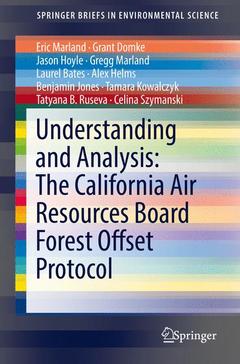Description
Understanding and Analysis: The California Air Resources Board Forest Offset Protocol, 1st ed. 2017
SpringerBriefs in Environmental Science Series
Language: English
Subjects for Understanding and Analysis: The California Air Resources...:
Keywords
biogenic carbon sinks; Forest Inventory and Analysis; forest offset protocols; California cap-and-trade program; Measurement Challenges & Uncertainty; Baselines and Boundaries; Model Uncertainty; Complexity and Accounting Flow; US Forest service; air pollution and air quality; Climate change management; Forestry Management
Support: Print on demand
Description
/li>Biography
/li>Comment
/li>
Laurel Bates
Laurel Bates graduated with a degree in mathematics from Appalachian State in 2016. She currently works as an economist at RTI International in Durham, NC.
Grant Domke
Grant Domke has leadership responsibilities for forest carbon estimation and accounting within the Forest Inventory and Analysis program of the USDA Forest Service. This program is responsible for reporting on greenhouse gas emissions and removals in the forest land category as part of the United States’ commitment to the United Nations Framework Convention on Climate Change.
Alex Helms
Alex Helms holds an MS from Appalachian State University in Accounting. His work is focused on environmental accounting and is particularly interested in equivalency and timing.
Jason Hoyle
Jason Holye is a research analyst for the Appalachian Energy Center. Hoyle has over 10 years' experience developing both renewable energy and carbon offset projects. He also created and currently serves as Editor of the North Carolina Economic Developer’s Guide to the Renewable Energy Industries.
Benjamin Jones
Benjamin Jones receives his BS in Mathematics in 2017 from Appalachian State University. He has focused on statistical methods and on programming and developing packages for R.
Tammy Kowalczyk
Tammy Kowalczyk is a professor in the Department of Accounting in the Walker College of Business at Appalachian State University. She specializes in financial and sustainability accounting and is the Sustainability Outreach Fellow for the university.
Eric Marland
Eric Marland is a professor in the Department of Mathematical Sciences at Appalachian State University. Following graduate work in theoretical biology at the University of Utah and postdoctoral work at the Institute for Theoretical Dynamics at the University of California at Davis, he has worked on issues related to carbon accounting and uncertainty for 14 years.
G




